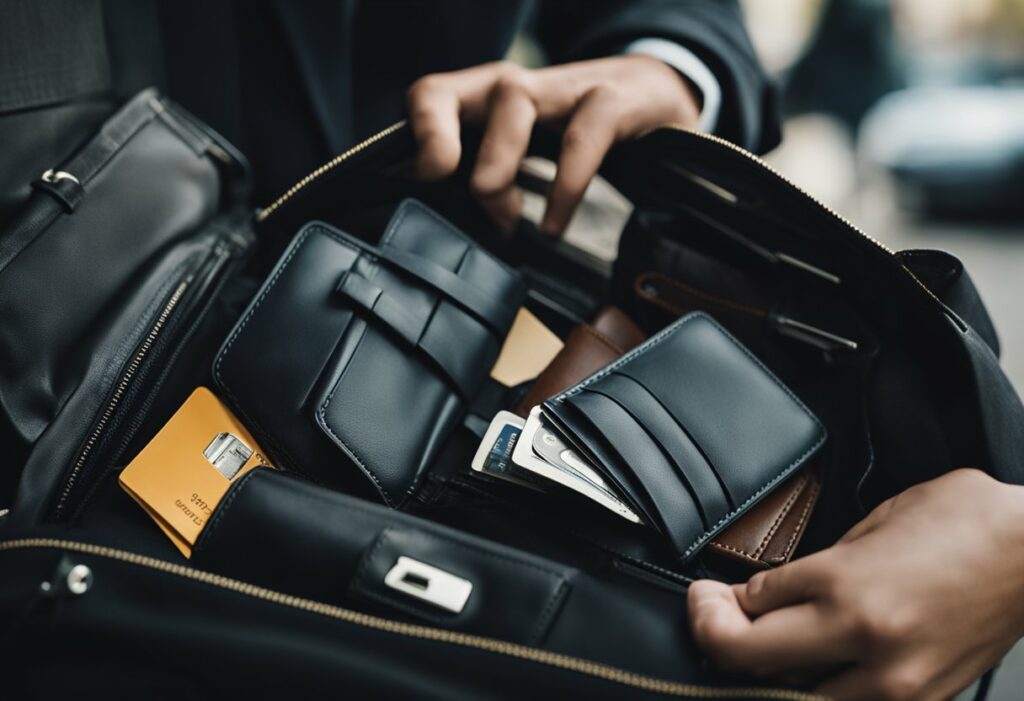
Imagine you’re reaching into your pocket or purse, expecting to find your wallet, but it’s not there. That sinking feeling isn’t just about the inconvenience or the potential financial loss; it might also stir deeper, more spiritual questions. Why did this happen? What does it mean?
Losing your wallet can feel like a small personal crisis. It’s not only about losing money and cards; it’s also about losing a piece of your identity.
Spiritually, this could be seen as a sign or a wake-up call. It might prompt you to reflect on what’s truly valuable in your life or to consider aspects of your life that need more attention or change.
This moment of loss could be more significant than you realize. It’s a chance to pause and ponder the non-material treasures that define who you are.
What lessons could this unexpected event be teaching you? Let’s explore the deeper implications of this common yet impactful experience.
The Spiritual Significance of Losing Your Wallet

Losing your wallet often goes beyond the immediate stress and inconvenience; it also holds deeper spiritual significance. This incident might encourage you to reflect on life’s less tangible aspects.
Symbolism and Impact on Personal Growth
Losing your wallet can symbolize the loss of identity and personal values, as wallets often contain vital pieces of identification such as driver’s licenses and credit cards.
This loss might cause you to question what defines you beyond physical possessions. It’s an opportunity to reassess your priorities and the material attachments you have.
By examining the impact of this loss, you might discover a greater sense of self-awareness and gain clarity on what truly enriches your life.
The experience serves as a reminder to value experiences over things, potentially leading to significant personal growth.
Cultural Interpretations and Meanings
Different cultures interpret the loss of a wallet in various ways. In some traditions, it’s seen as a sign of upcoming financial turmoil or personal loss, prompting individuals to manage their finances more carefully or reflect on their expenditures.
Other cultures might view this event more positively, considering it a push toward spiritual awakening or detachment from material goods.
This perspective encourages you to look beyond material wealth and evaluate your spiritual richness. Exploring these cultural meanings can offer comfort and a different viewpoint, helping you cope with the loss more effectively.
Emotional and Mental Effects of Losing Your Wallet

Losing your wallet can stir up a whirlwind of emotions, from panic to sorrow. This section explores the deeper emotional and mental impacts following such a loss.
Navigating Uncertainty and Anxiety
When your wallet’s gone, a sudden surge of uncertainty floods in. You worry about the loss of personal items like your ID, credit cards, and perhaps sentimental keepsakes.
This moment triggers anxiety, not just about the immediate inconveniences, but also concerning potential theft or fraud. Handling this situation requires calm and practical steps.
First, you’ll need to cancel your cards and secure your identity. As you manage these tasks, you might confront the fragile nature of personal security, reflecting on how quickly material security can vanish.
Lessons in Detachment and Prioritization
The loss of a wallet often serves as an unintentional lesson in detachment.
You are compelled to consider what’s truly important. Is it the cash, the credit cards, or the sense of identity tied to these items? This situation forces you to prioritize your values, perhaps realizing that your peace of mind isn’t rooted in possessions.
Over time, this experience might encourage a more minimalist lifestyle, highlighting the freedom that comes from letting go of material weights and focusing more on life’s immaterial joys.
You may also like:
Practical Implications of Wallet Loss

Losing your wallet isn’t just a spiritual or emotional journey; it also brings practical challenges that demand immediate attention and reassessment of material attachments.
Immediate Steps to Take After Losing Your Wallet
Once you realize your wallet’s gone, the first action is to secure your financial accounts. Contact your bank and credit card issuers to report the loss and freeze or cancel your cards.
This step helps protect against unauthorized access and potential financial theft. Next, if your wallet contained essential IDs or documents, filing a report with the police might facilitate replacements, and it provides a record should your wallet be misused.
Replacing your driver’s license or other government IDs promptly will also reduce potential hassles in daily activities. Keeping digital copies of important cards and documents helps you recover faster from such losses.
Long-Term Perspective on Material Loss
After the initial frenzy subsides, consider this loss as a nudge toward evaluating what’s truly essential. Many find that material belongings possess less value than previously thought.
Embracing a minimalist approach not only simplifies your lifestyle but can also make it more fulfilling. Replacing every item in your wallet isn’t always necessary.
Reflect on the utility of each card or document lost and decide if it genuinely needs replacement. This situation often leads people to streamline their possessions, keeping only what serves a purpose or holds significant value.
Spiritual Lessons and Opportunities

Losing your wallet isn’t just a practical inconvenience; it presents unique spiritual lessons and opportunities for personal growth. This section delves into the deeper implications that can arise from such an event.
Trust and Generosity in the Face of Loss
Losing a wallet often feels like a breach of your personal security, potentially leading to distrust towards others. However, this incident also offers a chance to cultivate trust and generosity.
If someone returns your wallet, it restores faith in the goodness of strangers. On the flip side, if it’s gone for good, you’re provided an opportunity to practice letting go and trusting that the loss could lead to new, unforeseen benefits.
This experience encourages a mindset where you can appreciate the help of others, promoting a sense of community and interconnectedness.
Finding Inner Strength and Support
When you lose something important like your wallet, it forces you to tap into your inner strength and seek out support in ways you might not have previously considered.
It’s an opportunity to assess your resilience and perhaps turn to friends, family, or a higher power for support.
This can deepen your relationships and enhance your understanding of your personal and spiritual foundations.
As you navigate the practical consequences of losing your wallet, you’re also invited to explore new parts of yourself, becoming stronger and more adaptive in the process.
Conclusion
Losing your wallet can be a profound spiritual journey wrapped in an inconvenient experience. It nudges you to explore deeper questions about what truly matters in your life.
Beyond the initial stress and hassle, it’s an invitation to embrace a lighter way of living with fewer attachments.
This unexpected event might just lead you to discover strengths and connections you never knew you had.
Remember every loss carries with it seeds of new growth and understanding. Embrace the lessons and let them guide you toward a richer more connected existence.
Frequently Asked Questions
What is the spiritual meaning of losing your wallet?
Losing a wallet often symbolizes a loss of identity and control, prompting a deeper reflection on non-material values. It encourages reevaluating what truly matters in life and can foster a renewed focus on personal growth and emotional resilience.
What do you do when you lose your wallet?
If you lose your wallet, immediately freeze your credit cards and contact your card issuers and bank. Report the loss to the police, notify the Social Security Administration, set up a fraud alert, and start replacing essential documents like your driver’s license. List everything that was in your wallet to track replacements.
What does it mean when you dream you are losing something?
Dreams about losing something can indicate a fear of loss in your waking life—be it control, possessions, or relationships. These dreams often reflect inner anxieties or insecurities about significant changes or emotional upheavals.
How to comfort someone who lost their wallet?
Express empathy and understanding without minimizing their feelings. Comforting phrases such as “I’m so sorry this happened to you. If there’s anything I can do to help you during this challenging time, please let me know,” can be very supportive.
What happens if you lose your hard wallet?
Losing a hardware wallet means losing access to any digital currencies stored on it unless you have a backup of your seed phrase. It is crucial to maintain and secure a backup of your seed phrase separately to restore access to your funds if needed.
